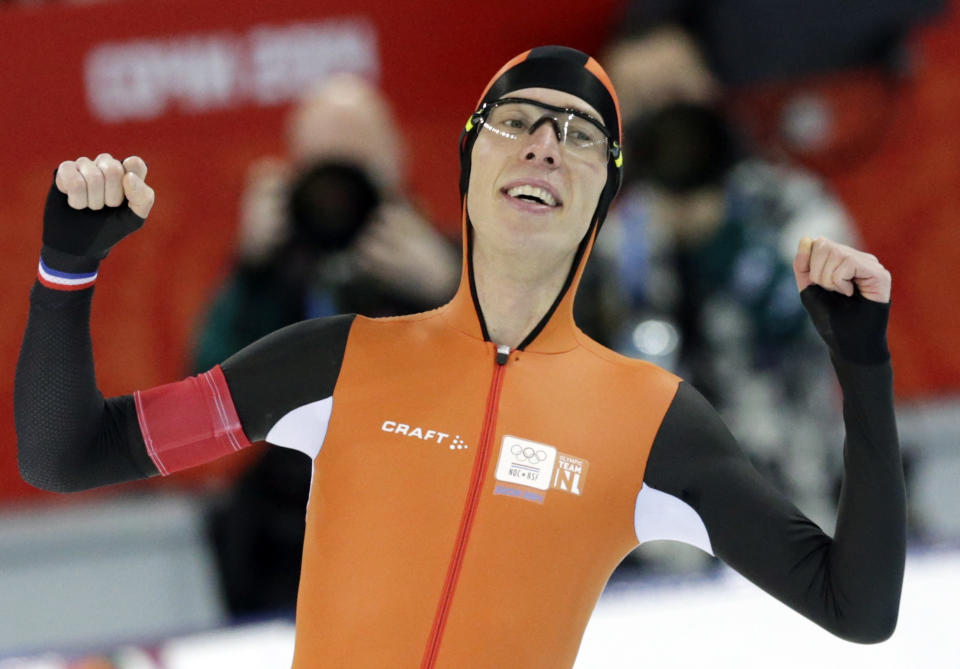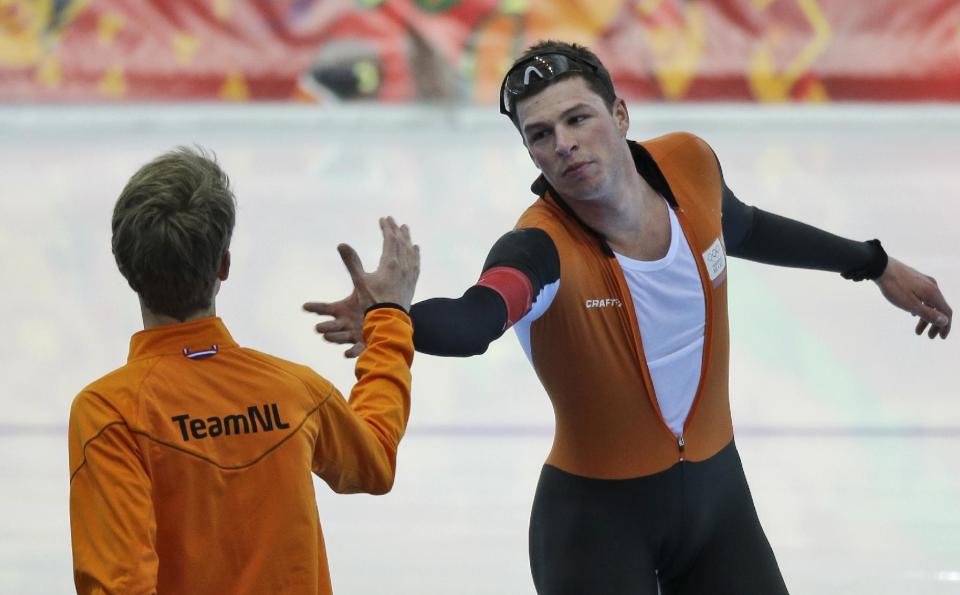Jorrit Bergsma knocks off Kramer in 10,000 meters
SOCHI, Russia (AP) — Jorrit Bergsma wouldn't go along with the storyline.
This was supposed to be about Sven Kramer's redemption, the place where the world's greatest distance skater finally made up for his incredible blunder four year ago.
Instead, Kramer was dealt another crushing disappointment.
With a stunner of a finishing kick, Bergsma upset his favored countryman to win speedskating Olympic gold in the 10,000 meters Tuesday with the fastest time ever at sea level.
"I understand that people really wanted to see Sven win here," Bergsma said. "But I skate for myself. I came here to win gold. I wasn't going to give away the gold for Sven's story."
Kramer gave away a sure gold at the 2010 Vancouver Games with a botched lane change. This time, he simply got beat by — almost inevitably at the Sochi Games — a fellow Dutchman.
Bergsma's time of 12 minutes, 44.45 seconds was less than 3 seconds off Kramer's world record, set at high altitude in 2007, and shattered the Olympic record of 12:58.55 by South Korea's Lee Seung-hoon four years ago.
Kramer settled for silver in 12:49.02. The bronze went to 37-year-old Bob de Jong, the oldest speedskating medalist in 86 years.
"This is really bitter, because I never took this into account," Kramer said. "Turns out, I simply was not good enough."
While the order of finish didn't go as expected, the guys on the podium were no surprise at all.
It was another orange sweep, the fourth 1-2-3 finish for the Netherlands at Adler Arena, its speedskating medal haul climbing to 19 out of a possible 27.
Bergsma's last five laps were all under 30 seconds, a pace Kramer simply couldn't match skating in the final pair with Lee.
"I was doing 29-second laps and was able to hold on to those late in the race," Bergsma said.
Kramer had already captured his second straight 5,000 gold in Sochi, but he really wanted to make up for the 10,000 victory that got away in Vancouver. During a routine crossover on the backstretch, Kramer's coach, Gerard Kemkers, absent-mindedly directed him to the wrong lane. The skater dutifully followed the instructions, leading to a disqualification. Lee took the gold, even though his time was 4 seconds slower than Kramer's.
"Four years ago was tougher than this. Here I was beaten by someone better," Kramer said. "I have to accept this, however tough it is."
Smooth and relaxed in the early laps, Kramer was grimacing in a desperate search for more speed the closer he got to the end. His lap times climbed steadily higher. When the bell rang for the final trip around the oval, Bergsma already was celebrating in the infield.
"He kept matching me for a long time," Bergsma said. "Then I realized he couldn't hold on to those laps."
On his cool-down lap, Kramer stopped to shake hands with his countryman. But he could barely muster a smile on the medal podium and didn't hang around long for the victory parade, leaving the arena to Bergsma and De Jong.
In recent days, Kramer said he's been bothered by problems with his thigh and back. He needed to be at his absolute best to beat Bergsma.
"Those are facts and absolutely no excuse," Kramer said. "It cost too much effort to skate effortlessly. I had to fight too hard to get into a rhythm and could not really get there."
In his fifth Olympics, De Jong won his fourth 10,000 medal with a time of 13:07.19. He's now got two bronzes to go along with a gold and a silver, becoming the first male skater to claim medals at four different Winter Games. The only older skater to win an Olympic medal was 38-year-old Julius Skutnabb, a silver medalist in the 5,000 at the 1928 Winter Games.
"I thought I could go a lot faster," De Jong said. "The conditions were much tougher than I thought."
Lee faded badly over the final laps, finishing fourth in 13:11.68.
There have only been 10 medal sweeps in all of Olympic speedskating history — four of them produced in Sochi by the amazing Dutch. They have crushed the previous record for overall medals at one games (13 by the East Germans in 1988) and tied another mark on Tuesday with their sixth victory in nine events, matching the Soviet Union's six golds at the Squaw Valley Games in 1960.
Bergsma was feted on Twitter by his fiance, American speedskater Heather Richardson.
"GOLD in the 10k for my amazing fiance," she wrote, "so happy for him!!!!"
As expected, the American speedskaters went another day without a medal. Seventeen-year-old Emery Lehman of Oak Park, Ill., finished 10th — more than 44 seconds off the winning pace. The high school senior got sick in a bucket labeled "Vomit Bin" after he was done with the 25-lap race.
Patrick Meek of Chicago, who got into the 14-man field as an alternate, was 11th.
In the middle of his news conference, Bergsma got a congratulatory call from the Dutch prime minister, Mark Rutte.
"That was kind of special," Bergsma said.
So was his race.
___
Follow Paul Newberry on Twitter at www.twitter.com/pnewberry1963






